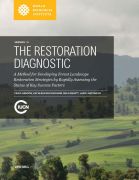Focal point
Location
World Resources Institute
The World Resources Institute is a global environmental think tank that goes beyond research to put ideas into action. We work with governments, companies, and civil society to build solutions to urgent environmental challenges. WRI’s transformative ideas protect the earth and promote development because sustainability is essential to meeting human needs and fulfilling human aspirations in the future.
WRI spurs progress by providing practical strategies for change and effective tools to implement them. We measure our success in the form of new policies, products, and practices that shift the ways governments work, companies operate, and people act.
We operate globally because today’s problems know no boundaries. We are avid communicators because people everywhere are inspired by ideas, empowered by knowledge, and moved to change by greater understanding. We provide innovative paths to a sustainable planet through work that is accurate, fair, and independent.
Resources
Displaying 41 - 45 of 94Making Women’s Voices Count in Community Decision-Making on Land Investments
Examines options for strengthening women’s participatory rights in the face of increasing commercial pressures on land in 3 countries: Mozambique, Tanzania, and the Philippines. Focuses on how regulatory reform – reforms in the rules, regulations, guidelines, and procedures that implement national land acquisition and investment laws – can promote gender equity and allow women to realize the rights afforded by national legal frameworks and international standards.
Encroaching on Land and Livelihoods: How National Expropriation Laws Measure Up Against International Standards
Encroaching on Land and Livelihoods examines whether national expropriation laws in 30 countries across Asia and Africa follow the international standards established in Section 16 of the Voluntary Guidelines on the Responsible Governance of Tenure of Land, Fisheries, and Forests in the Context of National Food Security (VGGTs). Section 16 of the VGGTs establishes standards on expropriation, compensation, and resettlement to ensure tenure security and responsible land governance. The UN Committee on World Food Security officially endorsed the VGGTs in 2012.
Encroaching on Land and Livelihoods: How National Expropriation Laws Measure Up Against International Standards
Encroaching on Land and Livelihoods examines whether national expropriation laws in 30 countries across Asia and Africa follow the international standards established in Section 16 of the Voluntary Guidelines on the Responsible Governance of Tenure of Land, Fisheries, and Forests in the Context of National Food Security (VGGTs). Section 16 of the VGGTs establishes standards on expropriation, compensation, and resettlement to ensure tenure security and responsible land governance. The UN Committee on World Food Security officially endorsed the VGGTs in 2012.
Scaling up regreening: Six steps to success. A practical approach to forest and landscape restoration
In a world grappling with the challenges of food insecurity, climate change, landscape degradation, and rural poverty, regreening offers a path forward, especially in dryland areas. The transformation of degraded landscapes—restoring productivity and increasing resilience through the widespread adoption of agroforestry and sustainable land management practices—can deliver food, climate, and livelihood benefits.
Table of contents:
Part I. Introduction
Part II. How and Where is Regreening Happening?
Part III. The Impacts Of Regreening
The Restoration Diagnostic A Method for Developing Forest Landscape Restoration Strategies by Rapidly Assessing the status of Key Success Factors
The Restoration Diagnostic is a structured method for determining the status of enabling conditions within a landscape being considered for restoration and for designing the requisite policies, practices, and measures needed for successful restoration. The Diagnostic was developed as part of the Restoration Opportunities Assessment Methodology (ROAM) by the World Resources Institute (WRI) and the International Union for Conservation of Nature (IUCN).








